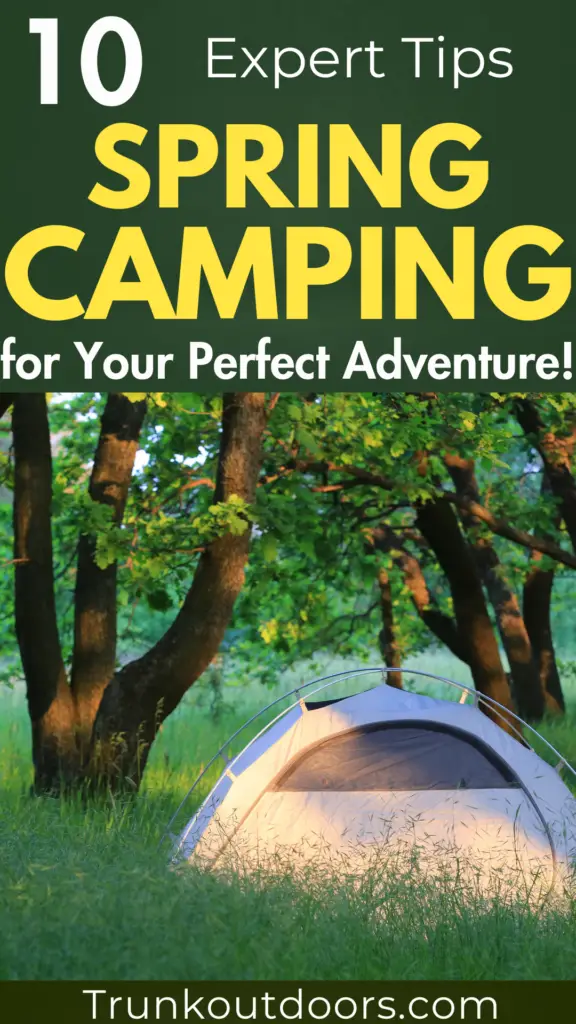10 Expert Spring Camping Tips for a Successful Outing
Spring is an ideal time to venture into the great outdoors, with warmer temperatures, blooming flora, and wildlife emerging from hibernation.
However, springtime camping can present unique challenges due to unpredictable weather and changing conditions.
To ensure a comfortable and enjoyable experience, follow these expert tips for spring camping.
1. Bring Extra Clothing and Footwear
Spring weather can be unpredictable, with sudden rain showers and fluctuating temperatures.
To stay dry and comfortable, pack additional clothing and footwear. Waterproof boots are ideal for wet conditions, but bring an extra pair of shoes for evenings around the campfire.
Layering your clothes will help you adapt to changing temperatures, and avoid cotton, which retains moisture and can make you cold.

2. Inspect Your Camping Gear
Before heading out, thoroughly inspect all your camping gear to ensure it’s in good condition.
Check your tent for any tears, mold, or missing parts. Test your lanterns, flashlights, and camping stove to make sure they work properly.
Inflate your sleeping pad and check for leaks. By identifying and addressing any issues early, you’ll have time to repair or replace gear as needed.
3. Plan for Hot and Nutritious Meals
Maintaining proper nutrition is crucial, especially in colder temperatures. Prepare hot meals in advance, such as soups and stews, and freeze them for easy reheating at your campsite.
Hot beverages like tea, coffee, or hot chocolate can help keep you warm. Instant meals and freeze-dried camping foods are convenient options if you prefer minimal cooking.
Read also: 22 Fresh And Flavorful Spring Dinner Ideas
4. Prepare for Moisture and Rain
Spring often brings rain and melting snow, leading to muddy trails and wet campsites.
Pack a good quality rain jacket and pants, and consider bringing a tarp to create a dry area under your tent’s rainfly.
Waterproof your gear using dry bags or plastic containers, and choose a tent footprint or groundsheet to keep your tent floor dry.
Read more: Camping In The Rain: 5 Essential Tips For Staying Dry And Comfortable
5. Be Aware of Wildlife and Trail Conditions
Spring is a time of increased animal activity, with many species giving birth or searching for food.
Maintain a clean campsite to avoid attracting unwanted visitors, and never approach or feed wild animals.
Trails may be muddy, washed out, or covered in debris, so wear sturdy, waterproof hiking boots and be prepared for changing conditions.
Read more: 7 Crucial Tips To Stay Safe From Wildlife While Camping
6. Choose Your Campsite Wisely
When selecting a campsite, look for higher ground and avoid low-lying areas prone to flooding or waterlogging.
Use a good quality groundsheet and tent pegs to secure your tent, and consider bringing a small shovel to create drainage trenches if necessary.
Read more: 13 Essential Campsite Safety Tips
7. Stay Informed About Weather Conditions
Spring weather can be unpredictable, with warm days followed by cold nights, and sudden rain showers.
Monitor the weather forecast closely and pack appropriate clothing for changing conditions.
A good quality, all-weather sleeping bag and insulated sleeping pad will help keep you warm and comfortable at night.
8. Conduct a Trial Run
Before embarking on your spring camping trip, conduct a trial run at a local campground to test your gear and practice your camping skills.
Set up your tent, inflate your sleeping pad, and test your camping stove. This will help you identify any issues with your gear and ensure you’re well-prepared for your adventure.
9. Pack Extra Bedding for Warmth
Nights can be cold during spring, so pack extra bedding to stay warm and comfortable.
Consider bringing a thermal blanket, hot water bottle, or even electric blankets if you have access to power.
Wearing thermal base layers, a warm hat, and gloves can also help keep you cozy at night.
10. Protect Yourself from Bugs
Spring brings an increase in insect activity, with mosquitoes, ticks, and other biting bugs emerging as the weather warms.
Pack insect repellent containing DEET, wear long-sleeved shirts and pants, and consider treating your clothing with permethrin for added protection.
Inspect your tent and gear for ticks and other bugs before retiring for the night.
Read more: Top 11 Tips To Keep Bugs Away While Camping

Conclusion
Spring camping offers a unique opportunity to experience the great outdoors with fewer crowds and milder temperatures.
By following these expert tips and being well-prepared, you can ensure a memorable and enjoyable camping adventure.
So, grab your gear, and head out to explore the beauty of spring!